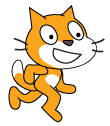 For a few terms now I have been taking two under 13 boys I mentor to a weekly coding class. It's part of a global network called Coderdojo. Ours is based around Scratch which is a graphic based coding language aimed at younger learners. Coders move blocks of graphic code around like lego to create a variety of quite complex programmes.
For a few terms now I have been taking two under 13 boys I mentor to a weekly coding class. It's part of a global network called Coderdojo. Ours is based around Scratch which is a graphic based coding language aimed at younger learners. Coders move blocks of graphic code around like lego to create a variety of quite complex programmes.
We do this for a number of reasons - we love gaming, we like spending time together, I want them to experience learning outside the classroom, one of them thinks he wants to be a game developer, they think they are tech savvy but really aren't (spending all their time on tablets and The Playstation) and the list goes on. What has ended up happening is I am seeing them learning new math skills, problem solving, perseverance and operating in the mid to high end of Blooms taxonomy. Coding is another language and I think it's important we all have an understanding of what goes on under the hood of our digital devices...
Below is an example of one of our Scratch Creations...
I have gathered a few coding readings and resources...
Paul Ford writes a story (more like a short novel...) about what code is from a coal face perspective...
For your entire working memory, some Internet thing has come along every two years and suddenly hundreds of thousands of dollars (inevitably millions) must be poured into amorphous projects with variable deadlines.
A computer is a clock with benefits. They all work the same, doing second-grade math, one step at a time: Tick, take a number and put it in box one. Tick, take another number, put it in box two. Tick, operate (an operation might be addition or subtraction) on those two numbers and put the resulting number in box one. Tick, check if the result is zero, and if it is, go to some other box and follow a new set of instructions.
You, using a pen and paper, can do anything a computer can; you just can’t do those things billions of times per second.
Most programmers aren’t working on building a widely recognized application like Microsoft Word. Software is everywhere. It’s gone from a craft of fragile, built-from-scratch custom projects to an industry of standardized parts, where coders absorb and improve upon the labors of their forebears (even if those forebears are one cubicle over). Software is there when you switch channels and your cable box shows you what else is on. You get money from an ATM—software. An elevator takes you up five stories—the same. Facebook releases software every day to something like a billion people, and that software runs inside Web browsers and mobile applications. Facebook looks like it’s just pictures of your mom’s crocuses or your son’s school play—but no, it’s software.It's a long read but will take you further into the code world that is for sure! (and you get a certificate at the end ... which is good coz you'll feel like you deserve one!)
Report: 6 of 10 Millennials Have 'Low' Technology Skills
"Digital natives aren't as tech-savvy as they think they are — at least, not according to their bosses.Opportunities to learn problem solving with technology must become the rule rather than the exception," the report's authors stated. "Now is the time for business to join forces with government, educators and other STEM (Science, Technology, Engineering and Math) advocates to ensure that all young people...have the opportunity to become tech savvy."http://thejournal.com/articles/2015/06/11/report-6-of-10-millennials-have-low-technology-skills.aspx
https://www.linkedin.com/pulse/20130716014745-7374576-why-you-need-to-know-code-and-how-you-can-learn-in-a-month?trk=mp-reader-card
In a world where kids are born with smartphones in their hands and iPads in their cribs, computer programming is becoming the new literacy. And though the number of coding jobs in America is set to grow 30% by 2020 (twice the rate of general job growth), understanding programming concepts—or even knowing a bit of code—will be important to almost any job of the future.
One Month Rails, created by an overachieving startup kid in New York named Mattan Griffel. Griffel experienced all the abovementioned frustrations when he taught himself to code, and because he comes from outside of the programming industry (and has a natural gift for teaching) he was able to distill all those frustrations and create a better mousetrap for teaching all of us wannabes to get up and coding in dramatically shorter time.https://onemonth.com/courses/one-month-rails/